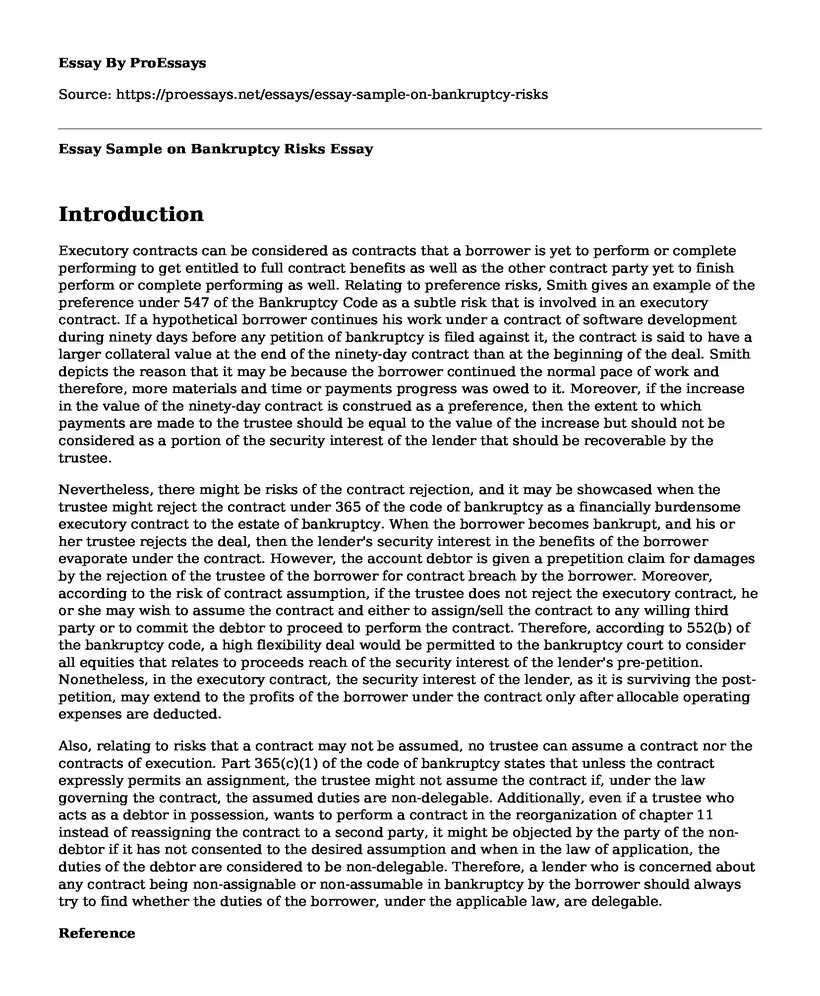Introduction
Executory contracts can be considered as contracts that a borrower is yet to perform or complete performing to get entitled to full contract benefits as well as the other contract party yet to finish perform or complete performing as well. Relating to preference risks, Smith gives an example of the preference under 547 of the Bankruptcy Code as a subtle risk that is involved in an executory contract. If a hypothetical borrower continues his work under a contract of software development during ninety days before any petition of bankruptcy is filed against it, the contract is said to have a larger collateral value at the end of the ninety-day contract than at the beginning of the deal. Smith depicts the reason that it may be because the borrower continued the normal pace of work and therefore, more materials and time or payments progress was owed to it. Moreover, if the increase in the value of the ninety-day contract is construed as a preference, then the extent to which payments are made to the trustee should be equal to the value of the increase but should not be considered as a portion of the security interest of the lender that should be recoverable by the trustee.
Nevertheless, there might be risks of the contract rejection, and it may be showcased when the trustee might reject the contract under 365 of the code of bankruptcy as a financially burdensome executory contract to the estate of bankruptcy. When the borrower becomes bankrupt, and his or her trustee rejects the deal, then the lender's security interest in the benefits of the borrower evaporate under the contract. However, the account debtor is given a prepetition claim for damages by the rejection of the trustee of the borrower for contract breach by the borrower. Moreover, according to the risk of contract assumption, if the trustee does not reject the executory contract, he or she may wish to assume the contract and either to assign/sell the contract to any willing third party or to commit the debtor to proceed to perform the contract. Therefore, according to 552(b) of the bankruptcy code, a high flexibility deal would be permitted to the bankruptcy court to consider all equities that relates to proceeds reach of the security interest of the lender's pre-petition. Nonetheless, in the executory contract, the security interest of the lender, as it is surviving the post-petition, may extend to the profits of the borrower under the contract only after allocable operating expenses are deducted.
Also, relating to risks that a contract may not be assumed, no trustee can assume a contract nor the contracts of execution. Part 365(c)(1) of the code of bankruptcy states that unless the contract expressly permits an assignment, the trustee might not assume the contract if, under the law governing the contract, the assumed duties are non-delegable. Additionally, even if a trustee who acts as a debtor in possession, wants to perform a contract in the reorganization of chapter 11 instead of reassigning the contract to a second party, it might be objected by the party of the non-debtor if it has not consented to the desired assumption and when in the law of application, the duties of the debtor are considered to be non-delegable. Therefore, a lender who is concerned about any contract being non-assignable or non-assumable in bankruptcy by the borrower should always try to find whether the duties of the borrower, under the applicable law, are delegable.
Reference
Smith, E. E. (1987). Executory Contracts as Collateral: Bankruptcy Risks. Com. Lending Rev., 3, 24.
Cite this page
Essay Sample on Bankruptcy Risks. (2022, Nov 22). Retrieved from https://proessays.net/essays/essay-sample-on-bankruptcy-risks
If you are the original author of this essay and no longer wish to have it published on the ProEssays website, please click below to request its removal:
- Personal Monthly Budget - Problem Solving Example
- Analytics: The Real-World Use of Big Data in Financial Services
- Research Paper on History of Riyad Bank
- Paper Example on Sleezy & Sly Co.: Unethical Use of Illegally Acquired Tax Package
- Essay Sample on Managed Care Redefines Health Insurance: Eliminating Generalization by Practitioners
- Essay on Maximizing Value Investment in Healthcare: Aligning Economic and Health Incentives
- Report Example on Cryptocurrency Formation







